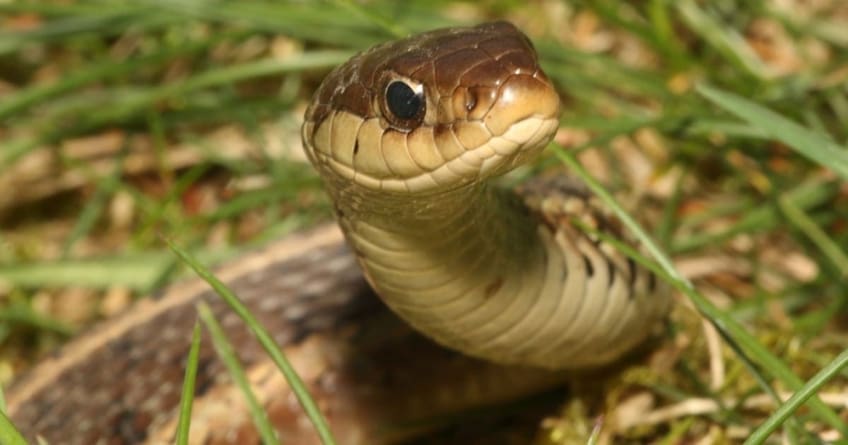
Steering clear of snakes is your best way to avoid being bitten by a snake. That’s not completely practical if you enjoy being outdoors. The next best you can do is recognize when snakes are active and learn how to best limit your exposure to them.
Snakes are most active in the spring, early summer, and fall. Most snakebites occur between April and October, when weather is warm and outdoor activities are popular.
Although most snakes aren’t poisonous, there are several kinds of snakes in the United States that are poisonous. These include rattlesnakes, water moccasins (also called cottonmouths), copperheads, and coral snakes.
Path to improved health
Here are some things you can do to reduce your risk of snakebites:
- Regularly trim hedges, keep your lawn mowed, and remove brush from your yard and any nearby vacant lots. This will reduce the number of places where snakes like to live.
- Don’t allow children to play in vacant lots with tall grass and weeds.
- Always use tongs when moving firewood, brush, or lumber. This will safely expose any snakes that may be hidden underneath.
- When moving through areas with tall grass and weeds, always poke at the ground ahead of you with a long stick or pole to scare any snakes away.
- Wear loose, long pants and tall boots when working or walking in areas where snakes are likely to be found.
- Never handle snakes, even dead ones. If you see a snake, slowly back away from it.
- Always sleep on a cot when camping.
- Be aware of snakes if you’re swimming or wading in rivers, lakes, or other bodies of water (this includes areas covered with water due to flooding).
- Learn to identify poisonous snakes and avoid them.
Things to consider
A bite from a poisonous snake is a medical emergency. If you or someone else is bitten by a snake, get help immediately.
You may not always know you were bitten by a snake, especially if you were bitten in water or tall grass. Signs and symptoms of snakebites may include the following:
- Two puncture marks at the wound
- Redness or swelling around the wound
- Severe pain
- Nausea
- Vomiting
- Difficulty breathing
- Fever-like symptoms, such as sweating
- Numbness or tingling sensation in the fingers, toes, or area around the wound
- Blurry vision
- Diarrhea
- Fainting
- Convulsions
- Rapid pulse
What should I do if I get a snakebite?
- Remain calm and call for help.
- If you’re alone, try to get to the nearest hospital as soon as you can.
- Restrict movement as much as possible and try to keep the wound just below the level of your heart. This will reduce the spread of venom.
- Take off any jewelry or tight clothing near the bite before swelling starts.
- Try to remember what the snake looked like: its color, shape, and markings. This will help with your treatment.
- Clean the bite with soap and water.
- Cover the bite with a clean, dry bandage.
What NOT to do if you are bitten by a snake:
- Never apply ice to the snakebite or soak the wound in water.
- Never cut the place that has been bitten.
- Never try to suck the venom out of the snakebite.
- Never apply a tourniquet or try to stop blood flow to or from the snakebite.
- Never try to pick up or trap the snake.
- Do not drink alcohol to relieve the pain of a snakebite.
- Do not drink caffeinated beverages such as coffee or soda after you’ve been bitten by a snake.
When to see a doctor
Snakes will usually avoid people and bite only if they feel threatened. Most snakes are fairly harmless (not poisonous/not venomous). Even so, if you’re bitten by any kind of snake, you should take it seriously.
Even non-venomous snakes can pose a threat if you haven’t had a tetanus booster shot within the past 10 years. If you have had a booster — and you know that the snake that bit you wasn’t poisonous — you may not need to see a doctor. Just be sure to disinfect the bite area and watch for symptoms such as fever and vomiting. If you have any symptoms, seek immediate medical care.
If you aren’t sure what type of snake bit you, treat is as a medical emergency.
Questions to ask your doctor
- Is there medicine I can take to make the bite feel better?
- What will my recovery time be for a snakebite?
- Are there any long-term effects from snakebites?
- Can you give me antivenom if I don’t know what kind of snake bit me?
Resources
Centers for Disease Control and Prevention: How to Prevent or Respond to a Snake Bite
![]()
Copyright © American Academy of Family Physicians
This information provides a general overview and may not apply to everyone. Talk to your family doctor to find out if this information applies to you and to get more information on this subject.











